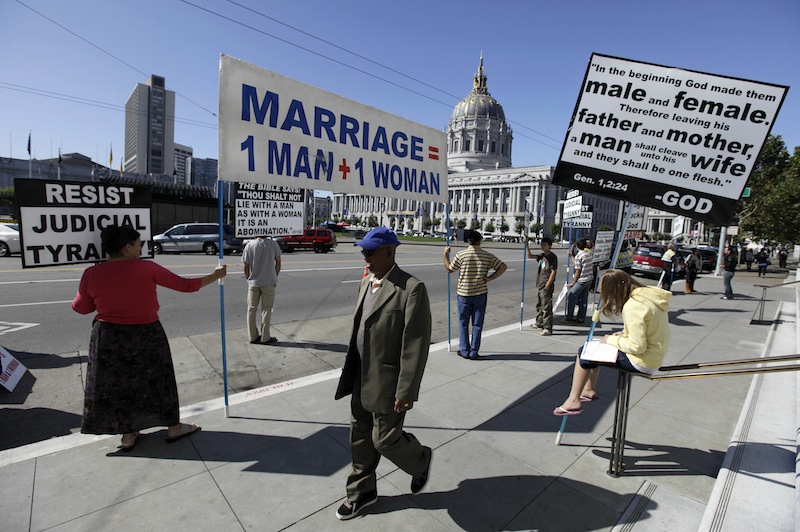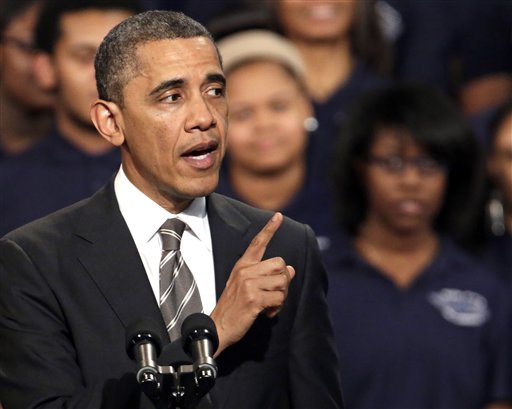WASHINGTON – The Obama administration told the Supreme Court on Thursday that California’s ban on same-sex marriage violates the Constitution’s guarantee of equal protection, a position that could also cast doubt on prohibitions in other states.
The administration did not endorse a constitutional right to marry that would apply nationwide. But its friend-of-the-court brief, a bold declaration of the administration’s interest in gay rights, said the court should review laws banning same-sex marriage under “heightened scrutiny.”
The administration’s entry for the first time into the legal battle over Proposition 8 — a voter initiative that amended the California State Constitution in 2008 to limit marriage to a man and a woman — also carried great symbolic value for those advancing the cause of marriage equality.
The Obama administration did not have to file a brief in the California case but said the question of how the court reviews laws that “target gay and lesbian people for discriminatory treatment” is of great interest to the government.
In California’s case, Solicitor General Donald Verrilli Jr. wrote, the state offers same-sex couples domestic partnerships but withholds marriage.
“California’s extension of all of the substantive rights and responsibilities of marriage to gay and lesbian domestic partners particularly undermines the justifications for Proposition 8,” the brief says. “It indicates that Proposition 8’s withholding of the designation of marriage is not based on an interest in promoting responsible procreation and child-rearing — petitioners’ central claimed justification for the initiative — but instead on impermissible prejudice.”
The government’s brief noted that seven other states have similar domestic partnership laws: Delaware, Hawaii, Illinois, Nevada, New Jersey, Oregon and Rhode Island. But it did not call for the court to overturn those laws.
In some ways, the brief marks a compromise between threatening the prohibitions on same-sex marriage that the vast majority of states have enacted and nudging along the number of states that allow such unions.
The administration has been under pressure from gay rights groups and others to enter the Prop. 8 case, especially after President Obama’s inaugural address, in which he said, “If we are truly created equal, than surely the love we commit to one another must be equal as well.”
Adam Umhoefer, executive director of the American Foundation for Equal Rights, called the brief “a powerful statement that Proposition 8 cannot be squared with the principles of equality upon which this nation was founded.”
“It is an unprecedented call to action by our government that it is time to recognize gay and lesbian Americans as full and equal citizens under the law,” he said.
Thomas Peters, communications director of the National Organization for Marriage and a supporter of Proposition 8, said his group “expects the Supreme Court to exonerate the votes of over 7 million Californians to protect marriage.”
“The President is clearly fulfilling a campaign promise to wealthy gay marriage donors,” Peters said in a statement. “There is no right to redefine marriage in our Constitution.”
The Supreme Court at the end of the month will consider two cases concerning same-sex marriage.
One addresses the Defense of Marriage Act, which restricts the federal government from recognizing same-sex marriages performed in those states where such unions are legal. The administration for two years has said that is unconstitutional, and a string of lower court decisions have agreed.
The other is Proposition 8, which was passed by voters after the California Supreme Court recognized a right for same-sex unions under the state constitution. More than 18,000 couples were wed in the meantime.
A federal district court and the U.S. Court of Appeals for the 9th Circuit struck down the amendment.
While the DOMA case concerns couples who are already married, the Proposition 8 case offers the Supreme Court a chance to examine whether there is a constitutional right to marriage that cannot be denied by the states. But, as the administration’s brief indicated, there are more limited ways the court could rule.
Currently, the District of Columbia, Maine and eight other states allow same-sex marriages, while nearly all the rest forbid it.
Obama’s position on same-sex marriage is an evolving one, he has said. While he opposed Proposition 8, he has never said he believed that the same-sex marriage issue should be decided on a national basis.
“I continue to believe,” he told ABC News last year when announcing his support of same-sex unions, “that this is an issue that is going to be worked out at the local level, because historically, this has not been a federal issue, what’s recognized as a marriage.”
Those who are defending Proposition 8 say the state’s acceptance of domestic partnerships proves that voters were animated by a desire to protect traditional marriage, not to discriminate against homosexuals.
But the administration said that domestic partnerships prove just the opposite. California has “recognized that same-sex couples form deeply committed relationships that bear the hallmarks of their neighbor’s opposite-sex marriages; they establish homes and lives together, support each other financially, share the joys and burdens of raising children, and provide care through illness and comfort at the moment of death,” the brief stated.
It said a reluctance to change the “traditional” definition of marriage is not a defense.
“Marriage has changed in certain significant ways over time — such as the demise of coverture and the elimination of racial restrictions on marital partners — that could have been characterized as traditional or fundamental to the institution,” Verrilli wrote.
A purported interest in responsible procreation and child-rearing cannot justify Proposition 8, the brief stated, because California confers “full rights of parenting and child-rearing on same-sex couples.”
And the administration said the court should not agree with an argument that it must respect “the will of the people” to amend the state’s constitution and to overturn the California Supreme Court’s decision allowing same-sex marriage.
In such cases, he said, the judiciary plays a special role in protecting minorities.
The administration’s brief is added to dozens that outside groups have filed in the same-sex marriage cases. Briefs have been submitted by states that allow such unions and those that forbid it; religious groups on both sides of the issue; Republicans who support same-sex marriage and conservatives who say it undermines a traditional way of life.
Labor unions and hundreds of major corporations weighed in on the side of same-sex marriage, for instance.
The AFL-CIO said its gay workers are economically harmed by laws that do not allow them to marry.
“These economic injuries are readily quantifiable in terms of the dollars gay and lesbian workers are forced to spend on higher costs and taxes, in the denials of access to publicly and privately provided benefits, and in the refusals of entry into and in the deportations out of the U.S.,” the union brief said.
The businesses, which included such giants as Microsoft and Nike and small businesses such as a winery in California, said restrictions against same-sex marriage cause extra work for them — over insurance coverage and taxes, for instance — and force them to categorize workers differently.
“It puts us, as employers, to unnecessary cost and administrative complexity, and regardless of our business or professional judgment forces us to treat one class of our lawfully married employees differently than another, when our success depends upon the welfare and morale of all employees,” the brief stated.
On the other side, 19 states, including Virginia, urged the court to overturn the 9th Circuit’s opinion, which it said overrode the will of California voters.
“The result is not merely vitiation of California’s co-equal sovereignty without a clear constitutional warrant,” the brief said. “It is disintegration of perhaps the most fundamental and revered cultural institution of American life: marriage as we know it.”
Send questions/comments to the editors.




Comments are no longer available on this story